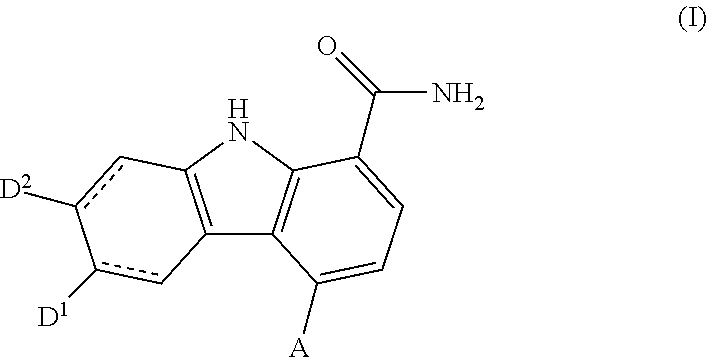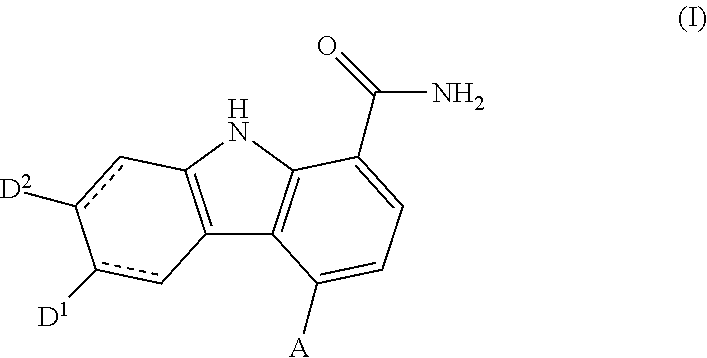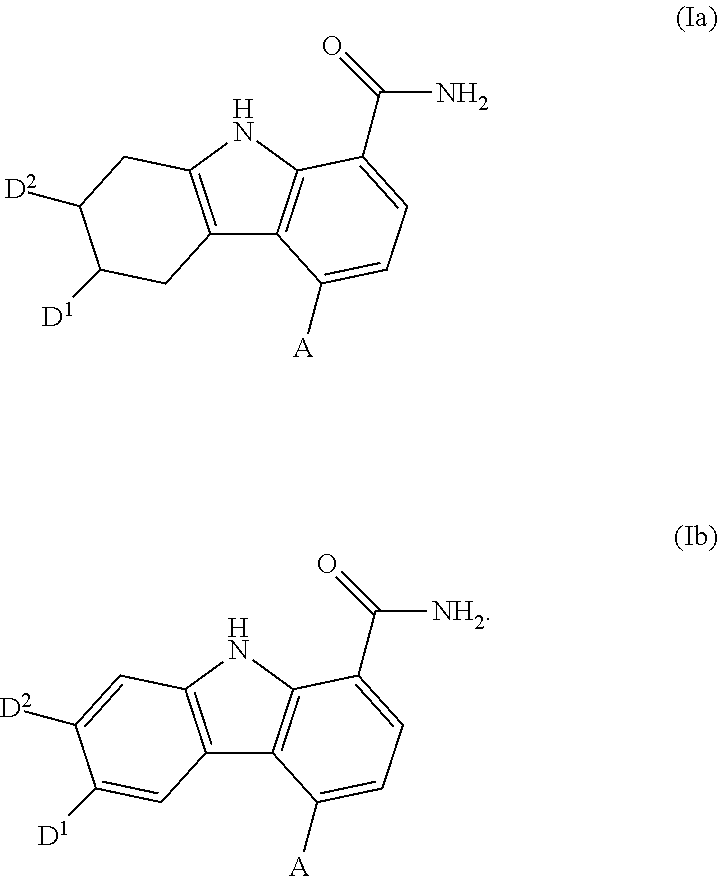Carbazole carboxamide compounds useful as kinase inhibitors
a carbazole carboxamide and kinase inhibitor technology, applied in the direction of biocide, drug composition, immunological disorders, etc., can solve the problem of marked improvement of disease progression
- Summary
- Abstract
- Description
- Claims
- Application Information
AI Technical Summary
Benefits of technology
Problems solved by technology
Method used
Image
Examples
example 1-1
Preparation of 4-bromo-7-(4-methylpiperazine-1-carbonyl)-9H-carbazole-1-carboxamide
[0487]
[0488]A suspension of 5-bromo-8-carbamoyl-9H-carbazole-2-carboxylic acid (Intermediate 49-1, 1.84 g, 4.97 mmol), EDC (1.334 g, 6.96 mmol), and HOBT (1.066 g, 6.96 mmol) in THF-DCM-DMF (4:1:1) (124 mL) was treated with 1-methylpiperazine (1.656 mL, 14.91 mmol) and the mixture was stirred at rt for 3 days. The mixture was concentrated and the residue was partitioned between DCM and NaHCO3 (aq). The organic phase was washed with brine, dried and concentrated to afford an oil. This was purified by column chromatography (DCM-2 M methanolic ammonia, 100:0 to 95:5 to 92.5:7.5). The resulting solid was suspended in EtOAc, collected by filtration and dried to provide 4-bromo-7-(4-methylpiperazine-1-carbonyl)-9H-carbazole-1-carboxamide (1.57 g, 76%). 1H NMR (400 MHz, DMSO-d6) δ 11.83 (s, 1H) 8.57 (d, J=8.13 Hz, 1H) 8.20 (br. s., 1H) 7.84 (d, J=8.35 Hz, 1H) 7.79 (s, 1H) 7.56 (br. s., 1H) 7.42 (d, J=8.13 Hz...
example 2-1
Preparation of 4-(5-aminonaphthalen-1-yl)-7-(4-methylpiperazine-1-carbonyl)-9H-carbazole-1-carboxamide
[0490]
[0491]Step 1 A solution of tris(dibenzylideneacetone)dipalladium (27.6 mg, 0.031 mmol) and tricyclohexylphosphine (1.0 M in toluene, 0.144 mL, 0.144 mmol) in 1,4-dioxane (8 mL) was purged with argon for 10 min. 4-Bromo-7-(4-methylpiperazine-1-carbonyl)-9H-carbazole-1-carboxamide (Example 1-1, 500 mg, 1.204 mmol), 4,4,4′,4′,5,5,5′,5′-octamethyl-2,2′-bi(1,3,2-dioxaborolane) (336 mg, 1.324 mmol) and potassium acetate (177 mg, 1.806 mmol) were added, bubbling was continued for another 5 min, and the mixture was heated in a sealed tube with stirring at 85-90° C. for 18 h. The mixture was cooled to rt and diluted with water and EtOAc and the layers were separated. The aqueous phase was extracted twice with EtOAc, and the combined organic phases were dried and concentrated. The residue was taken up in acetonitrile, filtered, and the filtrate was concentrated to give 7-(4-methylpipera...
example 2-2
Preparation of 4-(isoquinolin-1-yl)-7-(4-methylpiperazine-1-carbonyl)-9H-carbazole-1-carboxamide
[0493]
[0494]Using the procedure of Step 2 of Example 2-1,7-(4-methylpiperazine-1-carbonyl)-4-(4,4,5,5-tetramethyl-1,3,2-dioxaborolan-2-yl)-9H-carbazole-1-carboxamide (the crude product prepared according to Step 1 of Example 2-1, 40 mg, 0.065 mmol) and 1-chloroisoquinoline (15.92 mg, 0.097 mmol) were converted to 4-(isoquinolin-1-yl)-7-(4-methylpiperazine-1-carbonyl)-9H-carbazole-1-carboxamide (6 mg, 20%). 1H NMR (400 MHz, DMSO-d6) δ 11.82 (s, 1H) 8.71 (d, J=5.5 Hz, 1H) 8.32 (br. s., 1H) 8.15 (d, J=7.7 Hz, 2H) 8.06 (d, J=5.3 Hz, 1H) 7.80 (ddd, J=8.2, 6.5, 1.5 Hz, 1H) 7.77 (s, 1H) 7.63 (br. s., 1H) 7.46-7.55 (m, 2H) 7.25 (d, J=7.9 Hz, 1 H) 6.71 (dd, J=8.2, 1.4 Hz, 1H) 6.24 (d, J=8.1 Hz, 1H) 3.46-3.62 (m, 4H) 2.18-2.34 (m, 4H) 2.16 (s, 3H). Mass spectrum m / z 464.3 (M+H)+.
PUM
 Login to View More
Login to View More Abstract
Description
Claims
Application Information
 Login to View More
Login to View More - R&D
- Intellectual Property
- Life Sciences
- Materials
- Tech Scout
- Unparalleled Data Quality
- Higher Quality Content
- 60% Fewer Hallucinations
Browse by: Latest US Patents, China's latest patents, Technical Efficacy Thesaurus, Application Domain, Technology Topic, Popular Technical Reports.
© 2025 PatSnap. All rights reserved.Legal|Privacy policy|Modern Slavery Act Transparency Statement|Sitemap|About US| Contact US: help@patsnap.com



